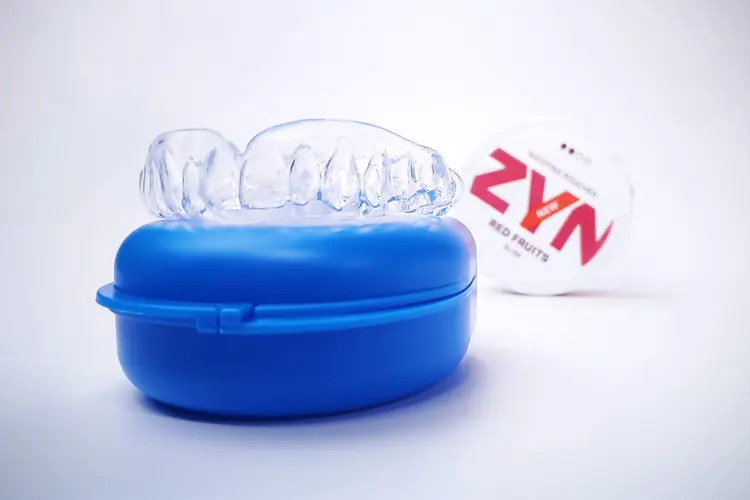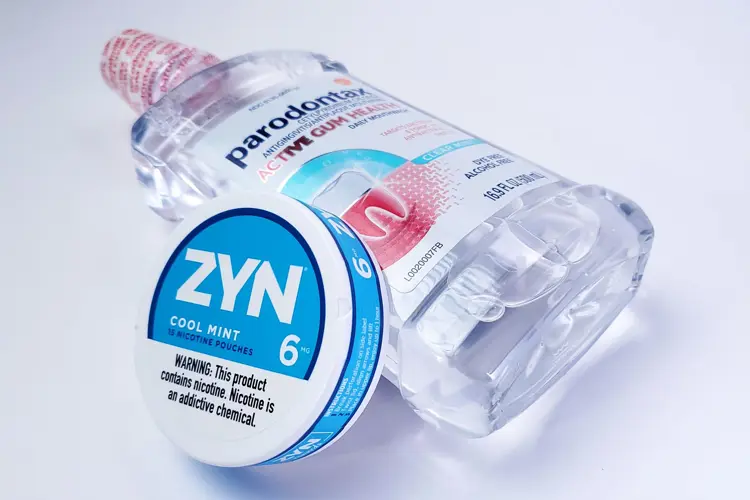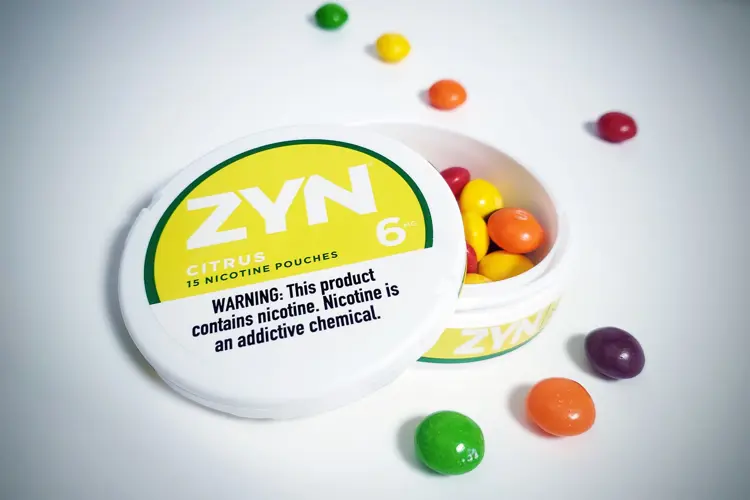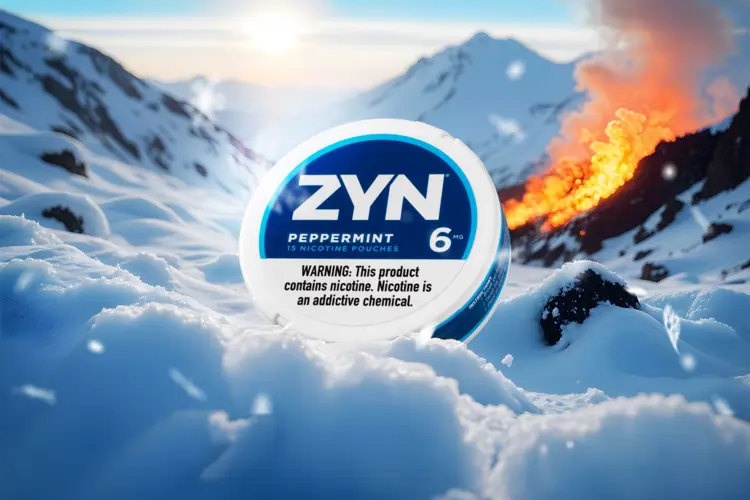- Nicotine can negatively affect oral health through cell damage, inflammation, vasoconstriction, and bruxism.
- Although more research is needed, evidence suggests that nicotine pouches may exacerbate gum recession, as seen in snus users.
- The degree to which pH balancers, pouch materials, preservatives, and flavorings impact gum health is unknown.
- Those with oral health conditions should consult with their dentist before using nicotine pouches.
- Nicotine pouches may promote plaque buildup; however, there is no evidence that they directly cause cavities.
Currently, there is little research on the relationship between nicotine pouch use and gum health. Most available data come from studies that directly focus on cigarettes and oral tobacco products.
ZYN and other nicotine pouches are much different, since they are both combustion- and tobacco-free, which results in considerably lower levels of toxic compounds than snus, chew, dip, or cigarettes. A reduced-risk product, however, is not necessarily a risk-free one.
Are nicotine pouches bad for your gums or teeth? Possibly. Although the actual degree of risk remains unknown, some researchers have identified potential oral health concerns stemming from ZYN use. Please note that many of the correlations and conclusions presented in the research are speculative.
Do ZYNs cause gum disease?
Gum disease (or periodontal disease) is an infection in the soft tissues that hold the teeth in place. Gingivitis is the mildest and most manageable form, but it can develop into periodontitis (an irreversible condition) if untreated.
Smokers have a much higher risk of gum disease than non-smokers. The risk increases with the number of cigarettes smoked, and the cases are often more severe. Of course, most of the health concerns associated with cigarettes do not apply to nicotine pouches, as these two products vastly differ in toxicity. However, they do share a common denominator: nicotine.
Nicotine and cytotoxicity
Cytotoxicity refers to the damage a substance inflicts on cells. Nicotine has been shown to induce cytotoxic effects, depending on the concentration.
A review of 42 in vitro studies suggests that the levels of nicotine in cigarettes, vapes, and nicotine replacement therapy (NRT) products like nicotine gum seem unlikely to be cytotoxic to periodontal and gingival cells in humans. The authors do, however, pose the possibility that cytotoxicity from smokeless tobacco may be possible due to increased saliva levels. This likely refers to chewing or dipping tobacco, which significantly increases saliva production.
It is worth noting that these studies merely exposed cells to nicotine in a laboratory, rather than testing results in a living human. Unique variables associated with different nicotine delivery methods (smoking, vaping, oral use, etc.) were not accounted for, and such studies should always be viewed skeptically.
Nicotine and inflammation
Another report suggests that nicotine is capable of deteriorating periodontal tissue by impairing inflammatory responses. Cytokines (signaling proteins) help control inflammation by mediating responses to invading bacteria. Nicotine has been shown to alter cytokine levels in mice, which may hinder their anti-inflammatory function.
Other researchers claim the evidence for inflammatory mediator impairment is “limited and contradictory.” A possible explanation for this contradiction may be that nicotine seems to exhibit both pro- and anti-inflammatory impacts on periodontitis, with the latter occurring at lower dosages.
A couple of the oral health concerns in this article have affected me personally, so I’ve become especially cautious with my ZYN use (and nicotine in general). First, I’ve had bruxism for as long as I can remember. Failing to use a mouthguard at night often results in waking up with a sore jaw or headache. Anxiety, caffeine, nicotine, and some medications can make the condition much worse, so I sometimes need to use a mouthguard during the day as well.
Bruxism can lead to an array of oral health issues, so it shouldn’t be taken lightly. There is no cure, but one of the ways I’ve been able to mitigate the symptoms is by using moderation with coffee and alcohol consumption. Even more importantly, I constantly monitor my nicotine intake, carefully balancing the use of both ZYNs and vapes.
The unfortunate result of my decades-long battle with bruxism is gum recession. This area of my mouth can be especially sensitive and prone to aggravation from nicotine pouches. If I’m not mindful of where I park my ZYNs, it can be a borderline painful experience. I also limit the frequency and duration of use to minimize the potential risks to the rest of my gumline. Nicotine pouches did not cause my oral health issues, but I accept that they could make things worse if I’m not cautious.
Nicotine and vasoconstriction
Nicotine is often associated with gum disease due to its vasoconstrictive effects. The constriction of blood vessels reduces the supply of oxygen and vital nutrients to the gums. This may promote and exacerbate gum disease by impairing the body’s ability to resist and eradicate infection.
Does ZYN cause gum recession?
Gum recession (also known as gingival recession) occurs when gum tissue supporting the teeth retracts or wears away. Symptoms include sensitivity in newly exposed areas, and even loose teeth in some severe cases.
While undetermined, some snus studies indicate that ZYN may potentially cause or worsen gum recession. A common side effect of frequent snus use is localized gingival recession in the area where the pouch is often parked.
Unlike snus, however, ZYN contains no tobacco, so this isn’t a perfect comparison. Tobacco products—even smokeless varieties—carry unique risks. However, despite this fundamental difference, snus and ZYN share many similarities:
- Both contain nicotine, pH balancers, preservatives, and (sometimes) flavorings
- They are administered in the same manner, and with similar frequency and duration of use
- Both use similar pouch materials (a non-woven fleece made from natural fibers)
Considering their similarities, one might expect these products to share a few side effects. The vasoconstrictive effects of nicotine, as previously mentioned, may play a role in gum recession. Also, while more research is needed, there are oral health concerns regarding the pouch material (irritation from friction against the gums) and flavorings.
Nicotine pouches and gum health conclusions
While unconfirmed, the data suggest that nicotine pouches may pose gum health risks for the following reasons:
- Nicotine can be cytotoxic (cause cell death) at higher concentrations
- Nicotine is capable of both pro- and anti-inflammatory effects depending on the concentration level (and under different conditions)
- Nicotine constricts blood vessels, which may promote and exacerbate gum disease and recession
- Gum recession is a known side effect of snus, which shares some similarities with nicotine pouches
- There are concerns that other ZYN ingredients (such as flavorings) could negatively impact oral health
Although it’s unlikely that ZYNs are a direct cause of gum disease, those with poor gum health would be advised to proceed with caution. The pouch material may induce further irritation and inflammation, and the vasoconstrictive effects of nicotine could hinder gum circulation.
Is ZYN bad for your teeth?
Like gum health, the degree to which ZYN affects the teeth has not been determined, although there may be some areas of concern.
Because periodontal disease can damage the jawbone, poor gum health may directly contribute to problems with the teeth as well. Thus, many of the previously mentioned concerns about nicotine pouches and gum health could be relevant to this discussion. A few other factors should also be considered:
Dental pulp inflammation
Tooth damage, such as cavities or cracks, can expose pulp cells inside the tooth. Introducing nicotine to these vulnerable areas may result in inflammation and infection, which could spread to the alveolar bone (the jaw ridge that contains the teeth sockets). If untreated, this could lead to an irreversible condition called pulp necrosis (pulp death).
Nicotine and bruxism
Involuntary grinding, gnashing, or clenching of the teeth (while awake or asleep) are characteristics of a condition called bruxism. It has a variety of causes, including stimulants like caffeine and nicotine. Jaw clenching and grinding can damage the teeth, leading to gum recession and even tooth loss in severe cases. Those suffering from bruxism are encouraged to use a mouth guard (“night guard”) to protect tooth surfaces while sleeping.
Do ZYNs cause cavities?
There is no evidence that the use of nicotine pouches directly causes cavities. ZYNs are sweetened with sugar-free acesulfame K, which has never been linked to tooth decay or cavities.
It is expected that some plaque could collect on surfaces of teeth that are frequently exposed to nicotine pouches. This, along with side effects like inflammation and gum recession, may suggest that nicotine pouches could indirectly contribute to cavity risks. Such assertions, however, are not backed by evidence. Clinical studies examining snus users versus non-users have shown no significant differences in the prevalence of cavities.
President Trump promised during his election campaign to “save vaping," but his administration has undermined that goal at every turn.
The U.S. disposable vape market has grown to $2 billion in annual sales, although nearly none of the products are authorized by the FDA.
More than 30 bills that would impose severe restrictions vaping consumers’ product choices remain active in U.S. state legislatures.
The Freemax REXA PRO and REXA SMART are highly advanced pod vapes, offering seemingly endless features, beautiful touchscreens, and new DUOMAX pods.
The OXVA XLIM Pro 2 DNA is powered by a custom-made Evolv DNA chipset, offering a Replay function and dry hit protection. Read our review to find out more.
The SKE Bar is a 2 mL replaceable pod vape with a 500 mAh battery, a 1.2-ohm mesh coil, and 35 flavors to choose from in 2% nicotine.





















